Appeals Court Reluctantly Dismisses Youth Climate Case
Air Date: Week of January 24, 2020
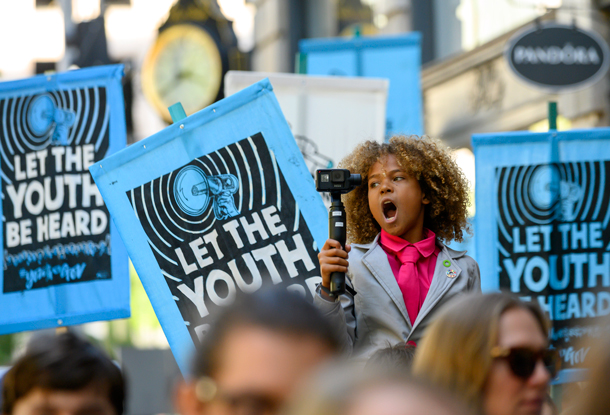
Youth plaintiff Levi Draheim rides on the shoulders of a supporter as he makes his way to a rally following a hearing in the Juliana v. United States climate change lawsuit. (Photo: Robin Loznak/Our Children’s Trust)
The U.S. Court of Appeals for the Ninth Circuit recently dismissed the Juliana v. United States case, in which youth sought to hold the federal government accountable for not doing enough to address climate change. Pat Parenteau of the Vermont Law School joins Host Bobby Bascomb to discuss the tough decision the judges faced and what could be next for the youth climate case which has already been before the US Supreme Court twice on procedural matters.
Transcript
BASCOMB: From PRX and the Jennifer and Ted Stanley Studios at the University of Massachusetts Boston, this is Living on Earth, I’m Bobby Bascomb in for Steve Curwood.
Some 3000 of the world’s most powerful corporate executives and government leaders recently gathered in Davos, Switzerland for a meeting of the World Economic Forum. The yearly event is an opportunity for this influential group to discuss their vision of an ideal future and the dangers that face the world at large. High on the agenda was climate change, which President Trump downplayed as a threat.
PRESIDENT TRUMP: To embrace the possibilities of tomorrow we must reject the perennial prophets of doom and their predictions of the apocalypse. These alarmists always demand the same thing, absolute power to dominate, transform and control every aspect of our lives.
BASCOMB: The elite participants at Davos were joined by climate activist Greta Thunberg, who spoke pointedly about the perils of turning a blind eye to climate change.
THUNBERG: I wonder what will you tell your children was the reason to fail and leave them facing a climate chaos that you knowingly brought upon them. Our house is still on fire. Your inaction is fueling the flames by the hour. And we are telling you to act as if you love your children, above all else.
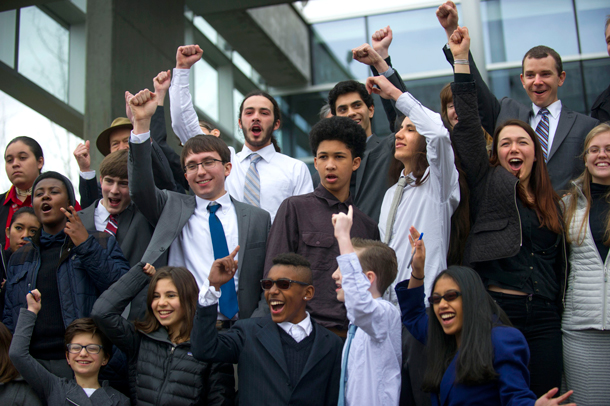
The Juliana v. United States youth plaintiffs cheer outside the federal courthouse in Eugene, Oregon after a hearing in district court. (Photo: Robin Loznak/Our Children’s Trust)
BASCOMB: Thunberg is one of many young climate activists speaking out to demand systemic change. For five years, the groundbreaking youth climate change case known as Juliana v. United States has been working its way through the courts. The 21 youth plaintiffs in the case argue that the federal government has failed to address climate change, which threatens their right to a livable planet. Now, before even going to trial, the case has reached what may be the end of the road. The U.S. Circuit Court of Appeals for the 9th Circuit decided, 2 to 1, to dismiss the case. Our legal expert Pat Parenteau of the Vermont Law School has been following Juliana VS the US since the beginning and joins us now from White River Junction, Vermont. Pat, good to have you back on Living on Earth!
PARENTEAU: Thanks, Bobby, good to be here.
BASCOMB: What reasons did the US Circuit Court of Appeals give for dismissing the Juliana case here?
PARENTEAU: Well, they basically considered this case a political question. And there is a doctrine, of course, in constitutional law, that the federal courts should not involve themselves in political questions that raise major policy issues that have to be decided by the other two branches of government, namely Congress and the executive branch. So this was a "reluctant" decision, as the court, the majority judges on the panel said. And they said, despite the compelling case that the plaintiffs had made about the dangers of climate change and the catastrophe that is looming, the courts are just not the place to go for broad-scale relief, and two members of the three-member panel just didn't see a way forward. They were worried that even if they ordered the government to produce a plan to address climate change, that they wouldn't be able to enforce the plan through the traditional mechanisms of injunctions and other things that courts do. I happen to think they're wrong about that. But that's what they decided.
BASCOMB: And why do you think they're wrong?
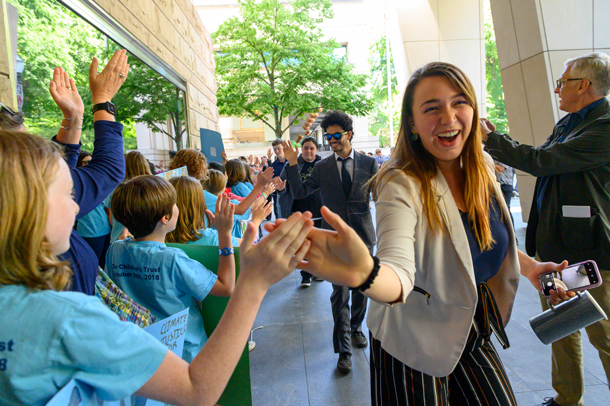
Youth plaintiff Kelsey Cascadia Rose Juliana high-fives supporters. (Photo: Robin Loznak/Our Children’s Trust)
PARENTEAU: Well, in part because they jumped the gun. This case was really about whether there should be a trial, and whether or not evidence should be heard. I mean, it has echoes of what's happening right now with impeachment, frankly. And usually what happens in cases is you have a lot of evidence and testimony about what kind of remedy would be appropriate to address, in this case, a constitutional violation. The underlying claim here is that the youth are entitled to a climate system capable of sustaining life on Earth, very fundamental claim. And the Ninth Circuit panel recognized the validity of that claim, acknowledged that was a valid claim to make, and a serious one. So if that's true, then you should have a trial on what kinds of remedies might be appropriate. It may not be everything the plaintiffs were asking for, which was a date certain by which we'd be at zero carbon. But it could have been a series of incremental steps, where the government gradually began to withdraw support for fossil fuels, and increase support for non fossil fuels and take a whole number of other actions: managing public lands better, not investing in offshore drilling, and so forth. So the problem with making a decision at this juncture is you don't have a full record of all the possibilities that the court might use to decide what to order the government to do or not do.
BASCOMB: And all three judges in this case were appointed by President Obama. How likely is it that this court was the best chance that these plaintiffs would have for a ruling in their favor, or at least proceeding to trial, as we talked about?
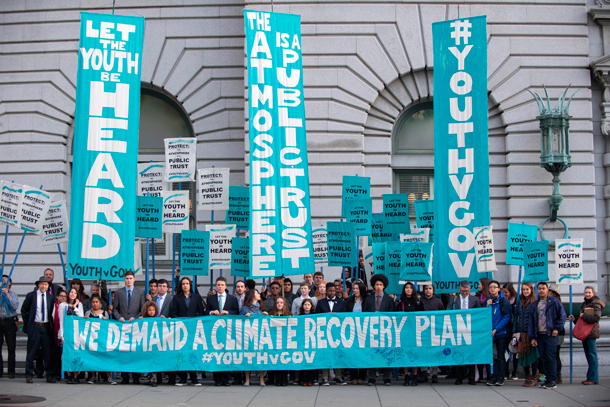
Plaintiffs in the Juliana v. United States case outside of the United States Court of Appeals for the Ninth Circuit. (Photo: Robin Loznak/Our Children’s Trust)
PARENTEAU: I think this was the best possible panel they could have drawn, and it was clear how sympathetic that judges were. Their heart was telling them they needed to do something to help the situation and address the legitimate claims the plaintiffs were making, and recognize that these youth plaintiffs had no power to prevent the harm that's coming. The Ninth Circuit panel talked about the fact that we're approaching a point of no return. The dissenting judge, Judge Staton, mentioned that it's like a asteroid hurtling at the earth, and the United States government has decided to take down its defensive mechanisms. So, they're, highly charged language in this opinion, about the nature of the danger that we're facing, in contrast to the ultimate resolution, which was the court throwing up its hands and saying, but there's nothing that we can really do about it. Pretty sad day, frankly, for, in my view, for the judiciary.
BASCOMB: Now, I understand the nonprofit Our Children's Trust, which is backing the Juliana plaintiffs, they've vowed to appeal the case to the full court. Does that mean this isn't necessarily dead?
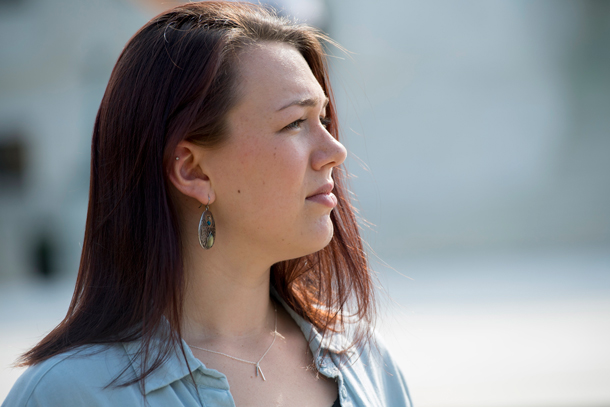
Lead plaintiff Kelsey Cascadia Rose Juliana is now 23 years old and vows to continue to petition the courts for a trial. (Photo: Robin Loznak/Our Children’s Trust)
PARENTEAU: It's not necessarily dead, and Our Children's Trust is on a mission, they're not going to probably yield willingly. Here's the problem with asking the full Ninth Circuit to review it. You have to have a majority of what, they're called the active judges on the court, to get a full court review. There are 29 judges on the Ninth Circuit. 10 of the judges on the Ninth Circuit have been appointed by President Trump, three of them by President Bush; there's very little chance that you could get a majority of the other judges on the Ninth Circuit to agree to rehear this. And even if they did agree to rehear it, it's very unlikely you would get a more favorable decision than the one that the panel has already rendered. And then the real question is, if that doesn't work, will they file a petition for review by the Supreme Court, and it looks as if they probably will do that as well. And the problem there is, is lawyers have to step back and think about the longer term interests of their clients in making a move like that. There's, there's a danger of letting your ego get in the way of your judgment. And they know they're right, in some sort of cosmic sense. And in terms of moral rectitude, they're right. What they're saying is absolutely right, and the courts should be responding. But you also have to take account of the reality that you do not have a Supreme Court that's open to this kind of very aggressive judicial intervention, so that you have to take account of the risks you're running of making really bad law in the pursuit of the good. And I don't envy the lawyers having to make this decision, but I trust them enough to think carefully before they take that step because it could have real long-term consequences.
BASCOMB: Well, now that the case has been dismissed, what if anything do you think has been accomplished in the course of this?
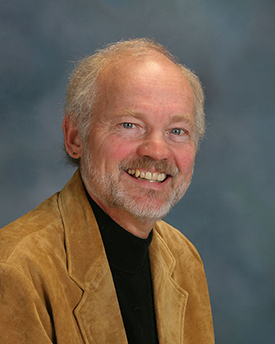
Former EPA Regional Counsel Pat Parenteau teaches environmental law at Vermont Law School (Photo: courtesy of Vermont Law School)
PARENTEAU: Oh, I think a lot has been accomplished. They've brought so much attention to bear on this problem. They've exposed the government, not just the current government but going back five different administrations and documented in detail all of the failures of the US government to address this problem, all of the opportunities that have been lost, and yet how much opportunity still remains. So just from the standpoint of building an historic record of this moment in time, the case has done an enormous amount. It's galvanized the youth movement around the world. It definitely had an impact on people like Greta Thunberg, and that whole coterie of the Sunrise Movement and the Extinction Rebellion and all of that wonderful energy that's coming out of the youth and the millennials at this point. It's inspired cases in other parts of the world. It inspired the case in Colombia, where the Colombian Supreme Court ordered the government to stop deforesting the Amazon basin because of the climate impacts and impacts on biodiversity and so on. And there are cases being brought even as we speak, in other countries in the world where the courts may be more open to intervening and doing something positive. So I think Our Children's Trust, the youth plaintiffs, the lawyers, have done a tremendous public service with this case. And it's going to echo down through the years. I'm sure of that. So, it's hard to do it, but I think you have to recognize you have accomplished a lot, and now it's time to turn the page and move on.
BASCOMB: Pat Parenteau is a professor at Vermont Law School. Pat, thanks again for taking the time with us today.
PARENTEAU: Thank you, Bobby. Always a pleasure.
Links
Read the U.S. Court of Appeals for the 9th Circuit’s full opinion on the Juliana case
The Our Children’s Trust website
Vox | “21 kids sued the government over climate change. A federal court dismissed the case.”
Living on Earth wants to hear from you!
Living on Earth
62 Calef Highway, Suite 212
Lee, NH 03861
Telephone: 617-287-4121
E-mail: comments@loe.org
Newsletter [Click here]
Donate to Living on Earth!
Living on Earth is an independent media program and relies entirely on contributions from listeners and institutions supporting public service. Please donate now to preserve an independent environmental voice.
NewsletterLiving on Earth offers a weekly delivery of the show's rundown to your mailbox. Sign up for our newsletter today!
 Sailors For The Sea: Be the change you want to sea.
Sailors For The Sea: Be the change you want to sea.
 The Grantham Foundation for the Protection of the Environment: Committed to protecting and improving the health of the global environment.
The Grantham Foundation for the Protection of the Environment: Committed to protecting and improving the health of the global environment.
 Contribute to Living on Earth and receive, as our gift to you, an archival print of one of Mark Seth Lender's extraordinary wildlife photographs. Follow the link to see Mark's current collection of photographs.
Contribute to Living on Earth and receive, as our gift to you, an archival print of one of Mark Seth Lender's extraordinary wildlife photographs. Follow the link to see Mark's current collection of photographs.
 Buy a signed copy of Mark Seth Lender's book Smeagull the Seagull & support Living on Earth
Buy a signed copy of Mark Seth Lender's book Smeagull the Seagull & support Living on Earth

